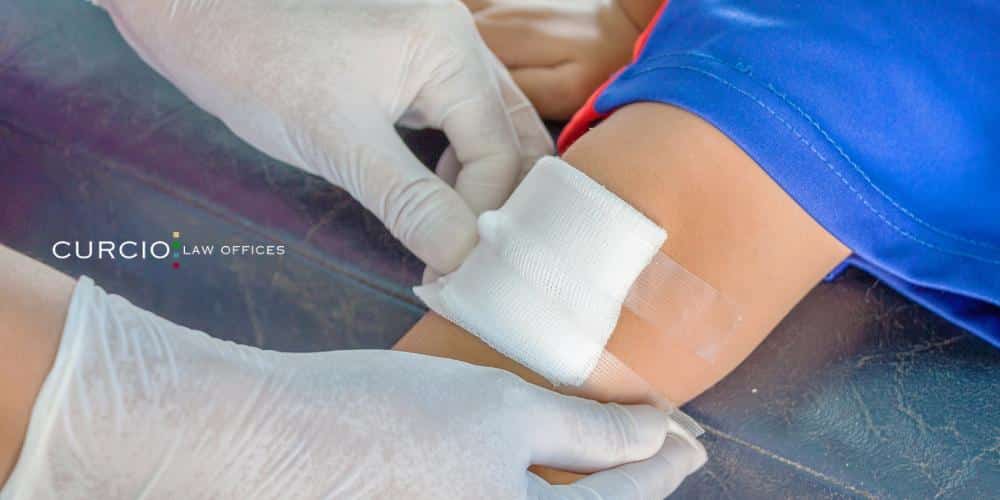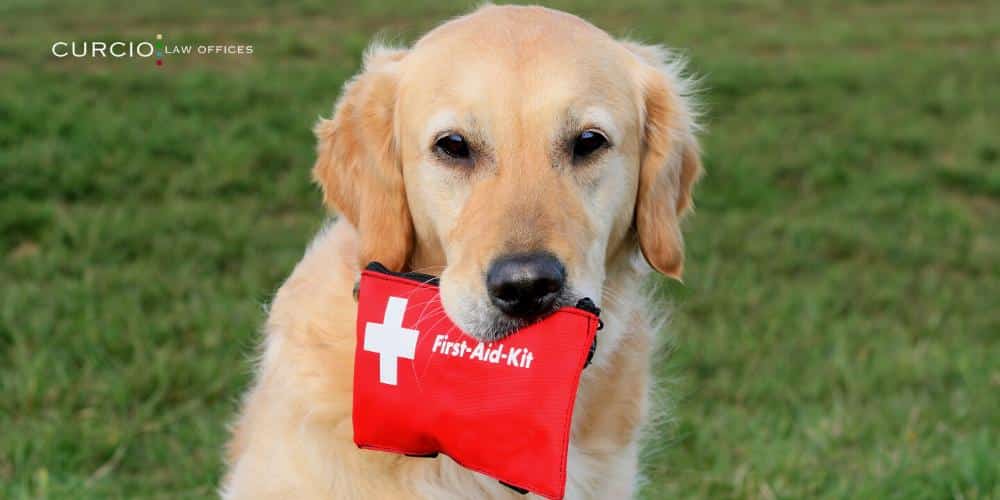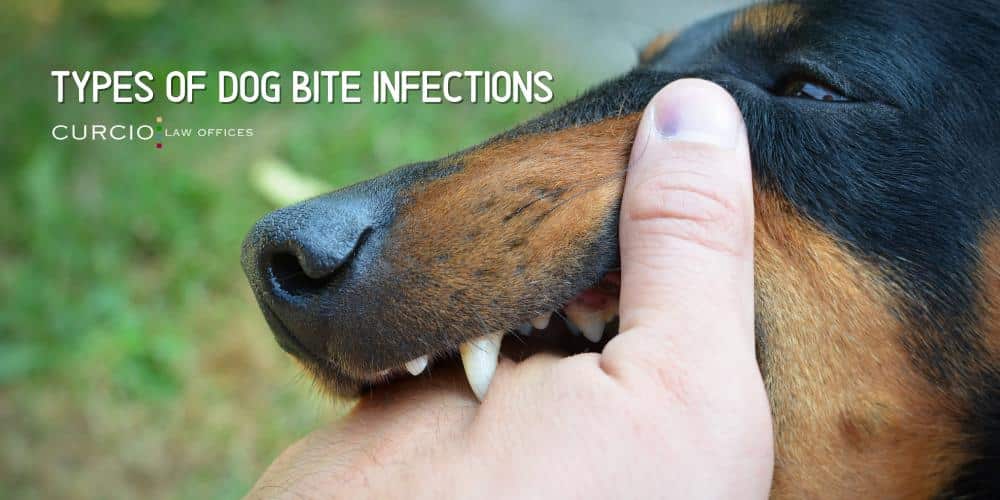Animal bites, such as dog bites, can be physically and emotionally traumatizing for almost anyone. Not only can dog bites lead to permanent scarring, disfigurement, and PTSD, but they can also lead to major infections. Below, our legal team breaks down common types of dog bite infections, and what to do to prevent a dog bite infection.
If you have suffered a major infection or injury from a dog attack, you have grounds to file a personal injury lawsuit against the dog owner. Chicago dog bite lawyers at Curcio & Casciato have what it takes to take on your case and help you recover financial compensation for your suffering. Call 312-321-1111 to schedule a free consultation today.
Can a Dog Bite Wound Get Infected?
Yes, dog bite wounds can definitely get infected if you don’t immediately wash the wound afterwards. Even still, the risk of infection is still there, especially if the dog was a stray and it gave you a deep wound.
Dog bites get infected from the bacteria present in the dog’s mouth. If the dog attack breaks the skin, this bacteria basically has easy access to spread throughout the body. That’s why it’s always important to see a doctor immediately after you’ve been bitten by a dog.
How Common Are Dog Bite Infections?
Of the 4.5 million dog bites that occur every year, approximately 10% to 15% of them get infected according to the American Academy of Pediatrics.
Cat bites actually carry a higher risk for infection compared to dog bites. In fact, the American Academy of Pediatrics claims that up to 50% of cat bites get infected.
Symptoms of an Infected Dog Bite
If you’ve been bitten by a dog or any other animal, you need to seek immediate medical attention in order to prevent infection. Some minor injuries can be cleaned and treated at home, but it’s always good to get a professional to check out the wound. If you’re experiencing any of the signs and symptoms of a dog bite infection listed below, then you definitely need to seek emergency medical care.
- Fever
- Chills
- Body aches, such as muscle or joint pain
- Shaking
- Nausea, vomiting, and/or diarrhea
- Swelling, redness, and warmth surrounding the wound
- The wound is oozing fluid and/or pus
- Red streaks extending from the wound, which indicates blood poisoning
- Difficulty moving the bitten body part
- Significant pain surrounding the wound
- Blisters around the wound

Common Types of Dog Bite Infections
Below, our legal team discusses the most common types of dog bite infections. If you have developed one of these infections after a dog bite, you have grounds to contact a Chicago personal injury lawyer at Curcio & Casciato.
Capnocytophaga
Capnocytophaga is a type of bacteria that lives in cat and dog mouths. This bacteria does not make cats and dogs sick, but it can be incredibly dangerous for the average person. A bite is not the only cause of this type of infection. A person can also develop this infection if a dog licks a pre-existing open wound, for example.
A capnocytophaga infection can develop within 1 to 14 days after a dog bite according to the CDC. Signs and symptoms of this type of dog bite infection include:
- Blisters around the bite wound
- Redness, swelling, pus, and pain from the bite wound
- Fever
- Abdominal pain, nausea, vomiting, and/or diarrhea
- Headache
- Confusion
- Muscle and joint pain
If you have any of these symptoms, you need to seek medical attention immediately. A severe infection can lead to major health complications such as gangrene, amputation of the bitten body part, heart attack, kidney failure, and even death.
If you’ve had to undergo amputation surgery because of a dog bite, contact a Chicago amputation attorney immediately.
Rabies
Rabies is a virus that has the potential to be fatal if not treated quickly. People can get rabies if a rabid dog bites them. Overall though, human cases of rabies are incredibly rare, with up to 3 cases reported per year in the United States.
Rabies can be treated via postexposure prophylaxis (PEP) which is when a person receives a rabies vaccine after they have been bitten by an infected animal. For the best chance of survival, the infected person must get a rabies vaccine on the day of the animal bite, and then again on days 3, 7, and 14 after the animal bite.
Tetanus
Tetanus, also known as “lockjaw,” is caused by the clostridium tetani bacteria. Tetanus can get into the body through open wounds that are contaminated with poop, saliva, or dirt. Some of the most common causes of a tetanus infection are stepping on a contaminated nail or getting bit by a dog. The best treatment for this infection is a tetanus vaccine.
Common signs and symptoms of a tetanus infection include:
- Jaw cramping and pain
- Muscle spasms in the stomach
- Full body muscular stiffness and pain
- Headache
- Fever
- Chills
- Sweating
- Difficulty swallowing
- Seizures
- Blood pressure and heart rate changes
Cellulitis
Cellulitis is a common type of skin infection that can be caused by dog bites. Symptoms of cellulitis include:
- Redness
- Swelling
- Pain around the bite
- The bite is oozing fluid or pus
The best treatment for a cellulitis infection is a round of antibiotics.
Pasteurella
Pasteurella is another type of bacteria that is often found in the mouths of cats and dogs. According to this study, pasteurella is the most common cause of soft tissue infections after dog and cat bites. A pasteurella infection can cause typical infection symptoms like redness, pain, swelling, and pus drainage.
Sepsis
Severe infections of any kind can lead to one of the three stages of sepsis, especially without immediate medical help.
Sepsis is a medical emergency that occurs when the body’s response to a pre-existing infection creates major inflammation. Without immediate medical attention, sepsis sufferers can experience organ failure and death.
People who have an increased risk of developing sepsis after a dog bite include elderly people, people with weakened immune systems, sepsis survivors, and people who are chronically ill.
How to Prevent Dog Bite Infections
Most dog bite wounds do not get infected, especially if you care for the wound quickly. If you sustained a minor injury, you can probably treat it at home. But you should always seek medical attention for severe bites.
In order to prevent infection after a dog bite, take these steps:
- Wash the wound thoroughly with warm water and soap
- Apply antibiotic cream (which can be found in a first aid kit) and then wrap the wound with sterile dressing
Can You Sue for an Infected Dog Bite?
Yes, you can sue the dog owner if you have suffered a serious infection or injury after a dog attack. Illinois, in particular, is a strict liability dog bite state. This means that the dog owner is legally responsible when their dog physically harms someone, regardless of if they were acting negligently or not. As long as you didn’t provoke the dog in any way prior to the attack, you can pursue compensation. A Chicago personal injury lawyer at Curcio & Casciato can help you file a claim in order to obtain justice.
Damages for a Dog Bite
A Chicago personal injury lawyer can help you pursue compensation for the following types of damages:
- Past and future medical expenses
- Lost wages
- Emotional distress
- Physical pain and suffering
- Permanent scarring and disfigurement
- Funeral and burial expenses if a dog bite infection results in wrongful death
Our Chicago emotional distress lawyers can help you calculate pain and suffering damages. If an infection leads to the death of a loved one, our Chicago wrongful death attorneys are here.

Call Chicago Dog Bite Lawyers at Curcio & Casciato Today
If you or a loved one has suffered from a dog bite infection or injury, you have grounds to file a personal injury lawsuit. Chicago personal injury lawyers and Chicago catastrophic injury lawyers at Curcio & Casciato have the skill and experience necessary to take on your dog bite case. We can help you obtain justice and financial compensation from the dog owner. Call 312-321-1111 to schedule a free consultation today.



